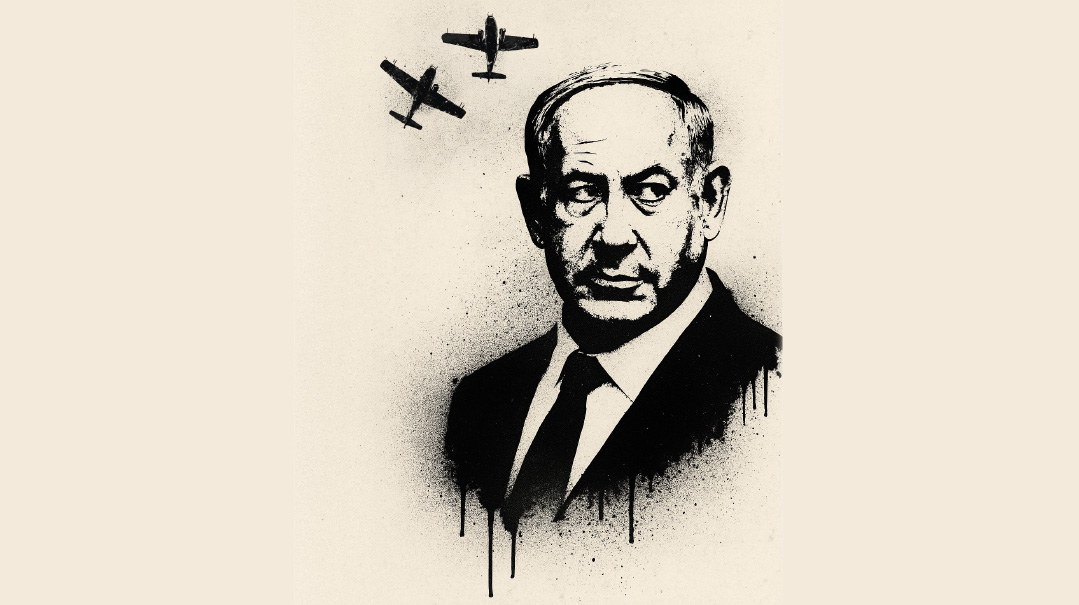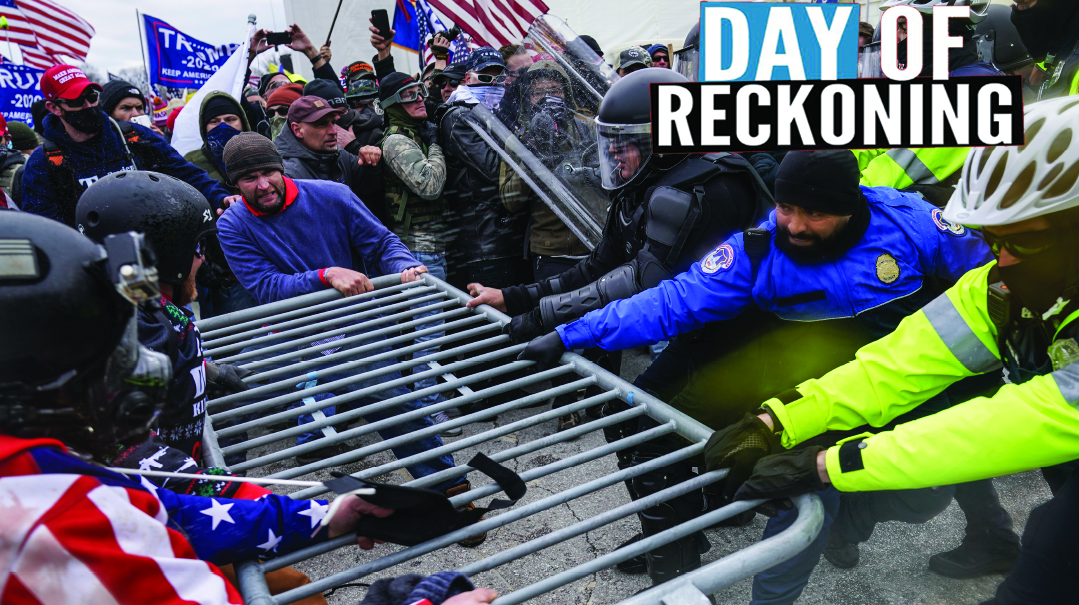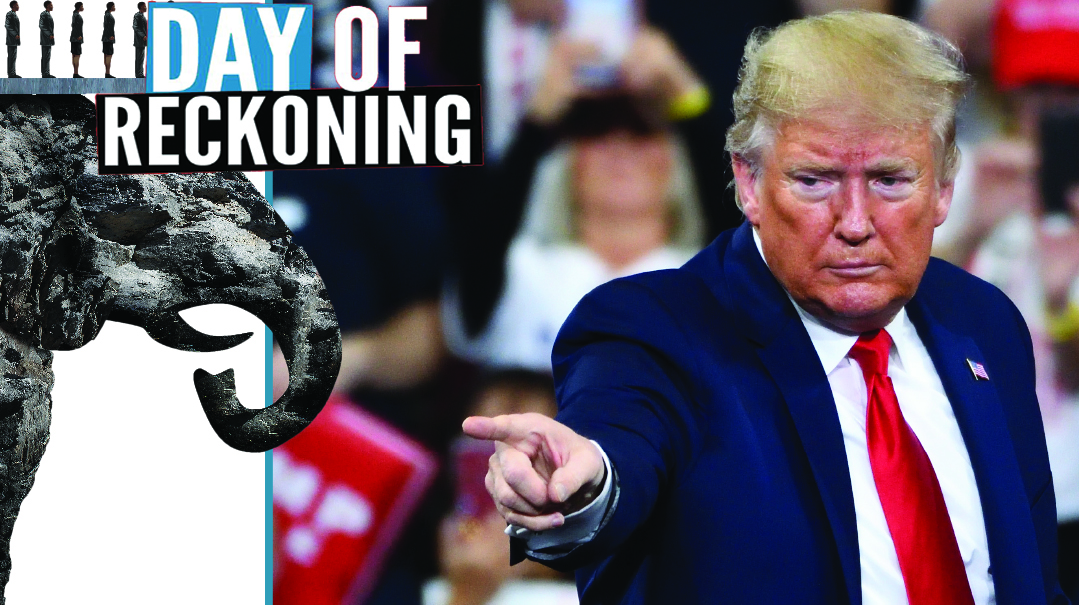The Man Who Dared

Bibi takes the reins at zero hour

Photos: Flash90; AP Images
Even as Bibi spent decades warning of the threat from a nuclear Iran, and acting behind the scenes to stave off that danger, he was derided as a coward, too hesitant to act. Last week’s stunning strike represents Netanyahu’s late-career emergence as a decisive war leader, at the head of a country heading into the unknown
IN a long-running campaign of character assassination that Barack Obama’s inner circle waged against Bibi Netanyahu, a 2014 article in the Atlantic was the most vicious.
“Myopic, reactionary, obtuse, blustering, pompous, and Aspergery,” were just some of the contemptuous adjectives that the Obamaites leveled at the Israeli leader according to editor Jeffrey Goldberg.
Unlike Team Obama’s patron saint, the Israeli prime minister was a “no-vision small-timer.” For the cardinal sin of refusing to sacrifice his country to create a Palestinian state he was deemed a “national leader who acts as though he is mayor of Jerusalem.”
Most devastating was the lip-curling judgment of cowardice for Bibi’s failure to attack Iran after all his warnings. Sheltering behind their anonymity, the intrepid Beltway briefers sneered, “He’s not Rabin, not Sharon, not Begin — he’s got no guts.”
That litany of scorn makes essential reading for anyone who wants to understand what has just happened in Iran. Because after a quarter-century in power, and decades spent warning the world of a nuclear-armed Iran during which he absorbed the contempt of politicians who just wanted to bury their head in the sand, Bibi has finally dared.
More than any other Israeli or world figure, the campaign to stop the ayatollahs from going nuclear is identified with Netanyahu. Without his statesmanship and vision, Western action to deter Tehran would have been even weaker than it has been.
What didn’t they say or do to prevent this strike. For the last 15 years, a whispering campaign against Bibi in the foreign press was stoked by Israeli opposition figures. Netanyahu’s own ministers and security chiefs leaked attack plans to the Americans to scuttle imminent strikes on Iran’s nuclear facilities.
And yet through it all, the Israeli leader soldiered on. The shadow war that he waged against the Iranians for the last decade and a half, was paralleled by a diplomatic struggle with American administrations determined to impose a weak deal with Iran on Israel.
That’s why the most audacious opening strike the world has seen since 1967 and the subsequent war, is 100 percent Bibi’s, for good and ill. Written off as a coward and a procrastinator, hesitant to pull the trigger where his predecessors were decisive, the last few days have seen Netanyahu emerge as a war leader bent on taking down the biggest threat in his country’s history.
The secular-raised Netanyahu has never worn the language of outright faith easily. But the note that he inserted in the Kosel’s ancient stones hours before ordering the jets aloft pointed to a dimension of faith present as he embarked on the greatest roll of the military dice since 1967.
“B’siyata d’Shmaya,” it notably began and then simply quoted one of the most stirring pesukim in the Torah.
“Hein am k’lavi yakum — Behold! The people will arise like a lion cub and raise itself like a lion.”
Bibi has dared, and now his legacy — stained by the disaster of October 7 and years of domestic dispute — will ultimately rise and fall on the outcome of this conflict.
Finally, Churchill
As the first wave of Israeli warplanes left behind smoking ruins where the Iranian military and scientific elite had once lived, a post appeared on Yair Netanyahu’s social media account.
The enfant terrible of the Netanyahu family posted a picture of his father the prime minister in heroic mold, a visionary smiling into the distance against the background of an Israeli flag. “I’m so proud of my father,” he wrote simply. “The Churchill of our times!”
So much ink has been spilled over the Bibi-Churchill parallel by Netanyahu fans and foes alike that it’s long passed into cliché territory. Bibi’s admiration for the greatest Briton of all time is well-known, and some of the parallels seemed valid.
Netanyahu like Churchill was elected to high office at a young age. Both found themselves in the political wilderness, dismissed as has-beens long before their prime.
Just as Churchill had refused to buy the appeasement advocated by his country’s political class, the Israeli leader made himself a pariah among his international peers for his unfashionable bellicosity against Iran.
Bibi became the only foreign leader since Winston Churchill to speak repeatedly in front of Congress. He would employ some of the same sonorous rhetoric as the British legend.
To round off the parallel, Bibi had a Churchillian penchant for cigars. The only thing missing was the bowler hat.
But there was one key difference between the two leaders. Whereas Churchill was recalled from political exile to defend his country from the Nazi peril that he’d spent a decade warning about, Bibi spent the 15 years after returning from opposition dithering when it came to making good on his threats against Iran.
True, he had excuses. He was indeed surrounded by left-leaning cabinet allies such as Ehud Barak in the early 2010s, and beset by American presidents who had no need for the tzaros of an Iran strike.
But throughout there was the sense that the Obamaites were right. Bibi’s speeches at the United Nations were full of devices like the famous red line when he literally drew a red line in marker through a caricature of a bomb meant to represent the Iran nuclear program.
He was prepared to unleash the genius of the Israeli security establishment on projects like the Stuxnet computer virus that wreaked havoc on the Iranian nuclear program in 2010. He would employ motorcycle-born assassins to knock off nuclear scientists in Tehran, as happened regularly from 2010.
But when it came to tough decisions like ordering all-out war, Bibi would threaten and bluster, but wouldn’t order the air force into action.
The Churchillian victory cigar sat in its case, but Bibi never had the excuse to smoke it — until now.
Echoes of History
Churchill wasn’t Netanyahu’s only model though. The other was far closer to home — in his childhood home, in fact. Benzion Netanyahu was a respected academic who edited the Encyclopedia Hebraica and specialized in the history of the Jews under the Spanish Inquisition.
It’s not hard to trace the influence of the academic father on his statesman son’s worldview. Bibi’s warnings about the lessons of Jewish history, his worldview that matched a deep pessimism with the insistence on Jewish power — these were all absorbed from his father.
So far, so well-known. But Bibi’s eponymous 2022 autobiography — written while Netanyahu was out of office after Naftali Bennett’s victory — reveals the deep impact that Benzion had on Bibi’s campaign against Iran.
As Netanyahu junior wrote, it was lessons learned from his father on a 1974 visit to Washington that became his guide in the long battle against the Iranian nuke.
It turned out that for decades, Benzion had failed to tell his son about the crucial role that he himself had played during World War II in the campaign to bring Republicans on board with the Zionist project.
A follower of Vladimir Jabotinsky, the founder of the Revisionist Zionists who were the political antecedents of today’s Likud party, Benzion Netanyahu absorbed his master’s teachings — and improved on them.
Jabotinsky advocated a “Theory of Public Pressure” in which he said that the strongest influence on a democratic government was public opinion. It didn’t matter whether individual politicians were well-disposed toward your cause — if you could win over their public, those leaders would back you.
For that reason, Jabotinsky himself decided to influence British public opinion by moving to London, still in 1929 the center of world power.
But Benzion Netanyahu had other ideas. He looked across the Atlantic and saw the next world power in the United States, and urged Jabotinsky to move there instead.
“Convince America,” he told his mentor, “and it will force Britian to change its policies.”
That visionary understanding of world politics was crucial in shaping Bibi’s own worldview. When it comes to protecting Israel’s vital interests, the son emulates the father in zeroing in on the essential amid the noise.
As prime minister, Netanyahu has consistently said that there is only one set of polls that he’s interested in. Not Israeli political polls — but surveys of American public opinion.
Bipartisan Breakthrough
Benzion the academic taught his son a second crucial lesson about American politics — one that has shaped the long-running campaign to neutralize the Iran threat. It was to bring both political parties on board.
The elder Netanyahu was a visionary in his understanding of political strategy. During World War II, the door to FDR’s Oval Office was guarded by Jewish leaders who identified fully with Roosevelt and detested Republicans. The GOP — bastion of country club anti-Semitism — returned the compliment.
In that context, what Benzion Netanyahu did was revolutionary: he set out to court Republicans.
“He did so not out of identification with one or the other party,” Bibi said “but because he believed that influencing Republican policy was the best way of influencing Democratic policy.”
Incredible as it may seem, the retiring academic was the progenitor of what later became bipartisan American support for Israel. Throughout the 1940s he made his way through the State Department, the US Army echelons, and finally the White House to build his case for a Jewish state.
It was he who convinced General Eisenhower — then the top US military officer — that supporting a state was in America’s interests as a bulwark against the Soviets. In the 1970s, a young Bibi enlisted his father to go to Prime Minister Yitzchak Rabin and explain how to use American public opinion to thwart the Secretary of State Kissinger’s pressure to give up the Sinai to Egypt.
Decades later, Bibi would draw on those lessons to court both parties. But as it became clear that Democrats were falling out of love with Israel, he leaned aggressively into courting Republican opinion. If and when Democratic leaders like Obama opposed his plans, the Republicans in Congress became powerful allies.
Collision Course
Bibi’s warnings about the peril of a nuclear-armed Iran began back when the Palestinian independence movement seemed to be the only threat on the horizon. In 1985, he wrote a book in which he warned of allowing the ayatollahs — then locked in a death struggle with Saddam Hussein’s Iraq — to possess nuclear weapons.
But it was only when he reentered the political arena as foreign minister in Ariel Sharon’s government in 2002 that he started to sound the alarm in earnest.
In fact, the Iran threat was the trigger for his return to politics. Having been defeated by Ehud Barak in 1999, Netanyahu spent a few years in business, and traveling the world with his young family. Those were the years in which the Oslo peace party was triumphant, and Bibi’s right-wing opposition seemed discredited.
What changed his mind about the political arena was Iran. “Politics ought to provide a life of purpose, and I had a purpose,” he wrote. “To address the threat of a nuclear Iran that would endanger my country.”
Bibi’s return to power coincided with the meteoric ascent of Barack Obama — the man who would become his nemesis over the Iran nuclear file.
From the beginning, the two men — so different in temperament and outlook — were on a collision course. Obama pressured Bibi to make concessions that would lead to a Palestinian state, but Bibi dug his heels in.
For his part, Netanyahu sought to enlist Obama in an aggressive campaign against Iran, but the Democratic president refused to play ball. Instead, Obama struck out on a course of realignment, that would distance the US from Sunni allies like Saudi Arabia, and embrace the ayatollahs instead.
So as his strident warnings of Iranian nuclear progress went unheeded, Bibi prepared to act. In 2010 and 2011, Israeli jets were almost ready to roll. The international media was abuzz with reports about an imminent attack.
Some of Netanyahu’s advisors back then pushed for a strike. One was his national security adviser, Major General (res.) Yaakov Amidror. In an interview after the Israeli strike last week, he told this writer that it was a mistake not to have struck a decade ago.
But in real time, Bibi blinked. He would go on to blame his security chiefs who argued that an attack would only delay the nuclear program by a few years.
Netanyahu’s response was that, “They said the same about Osirak” — referring to Prime Minister Menachem Begin’s successful strike against Saddam Hussein’s nuclear program in 1982. “Yet thirty years later,” argued Bibi “Osirak is still not rebuilt. No none can take into account the psychological and political effects of a powerful strike.”
Netanyahu also argued that if Israel were to strike without getting the administration’s consent, American public opinion would fill the gap — just as Benzion Netanyahu had taught.
“If Israel acted alone, I believed that we could mobilize American public and congressional opinion which would induce the administration to support or at least not oppose us.”
But Bibi had to contend with an alliance of Israeli and American officials determined to scuttle his operation. Shimon Peres would later admit that he’d worked to torpedo the move, although he didn’t say how. Former chief of staff Gabi Ashkenazi and Mossad head Meir Dagan were both accused of refusing a direct order from Netanyahu to attack Iran. Notably, Dagan didn’t deny the charge, merely saying that Bibi’s order was “illegal.”
Then there were the reports that the Obama administration had leaked details of a plan to use Azerbaijan as a forward base to attack Iran.
Faced by such opposition, Netanyahu folded and Obama went on the offensive with moves that ultimately became the Iran Deal of 2015.
Having missed the window to attack the Iranians, Bibi lost the initiative. He became a spectator as Obama took control, and looked with contempt at the Israeli leader who talked big, yet wouldn’t dare.
Speaking Out
President Obama was a master of the petty snub — a talent that he liberally employed when it came to Netanyahu. Obama may or may not have intended to slight the Israeli leader when he was pictured — feet on the table — talking on the phone to Bibi. But he undoubtedly meant to put Netanyahu in his place in 2010 when he left a meeting to have a leisurely dinner with his family — with Bibi left to cool his heels for an hour in the White House.
None of that deterred Israel’s longest-serving prime minister who fought back on Obama’s home turf. Employing both of Benzion Netanyahu’s principles — of talking directly to the American people and of leveraging the opposition party — Bibi embarked on a public campaign to thwart Obama’s Iran Deal.
That campaign reached its height in an act of unprecedented defiance when Bibi spoke to a Republican-led Congress, making his case against the deal in America’s most important pulpit.
As Bibi confidant and then-ambassador to Washington Ron Dermer told this writer, Bibi’s willingness to defy Obama in his own backyard raised Isael’s stock among the Gulf Sunni states. They began to see Bibi as the head of an anti-Iran axis. If Washington was intent on appeasing Iran, Netanyahu was leading the attack.
In retrospect, perhaps Bibi’s biggest achievements in the eight years of Obama’s presidency were staving off the threat of a Palestinian state, and keeping the Iranian threat on the international agenda.
When America’s first black president left the White House still surrounded by his halo of greatness, there was a strong case against appeasement of Iran.
That was down to one man only — Bibi. His legendary media appearances, personal diplomacy and status as one of the 21st century’s preeminent statesmen had almost single-handedly carved out a space for a sharp change in American policy on Iran.
The gloating of the Obama crew proved premature. In that 2014 Atlantic interview, a policymaker had concluded that Bibi was well and truly foxed.
“It’s too late for him to do anything. Two, three years ago, this was a possibility. But ultimately, he couldn’t bring himself to pull the trigger. It was a combination of our pressure and his own unwillingness to do anything dramatic. Now it’s too late.”
But Bibi had outlasted Obama, and that was what mattered.
Undone Deal
Throughout Donald Trump’s first term, only a laser would have been able to detect daylight between Washington and Jerusalem. Trump was the gift that didn’t stop giving, gifting Bibi an embassy in Jerusalem, recognition of Israeli sovereignty over the Golan Heights among other bonbonnieres.
But regarding Iran, Netanyahu only got half of what he wanted. Trump withdrew from Obama’s Iran Deal in 2018, and ratcheted up punishing sanctions on Iran.
But on a mission to detach from the Middle East, he refused to take on Iran with the business end of an American bomber force.
That anti-war stance was thrown into sharp relief by his failure to lift a finger when Iran devastated the Saudi oil industry in a cruise missile and drone attack in 2019.
In a bid to convince Trump of the threat from Iran’s nuclear program, Bibi ordered one of the Mossad’s most audacious missions of recent times. In 2018, an Israeli force snatched the entirety of the Iranian nuclear archive from a building in Tehran.
Agents armed with torches that burned at 3,600 degrees cut their way into six giant safes and spirited away the incriminating haul to Israel. The world was forced to acknowledge what Israel had long claimed: Iran was working toward nuclear weapons.
At a news conference in Tel Aviv shortly after, Bibi resumed his beloved pose of lecturer-in-chief. Standing in front of giant screens, he schooled the world in the intricacies of the Iranian nuclear program.
The nuclear library heist was part of a series of brilliant intel-driven operations to set back the Iranian nuclear program that became a hallmark of Bibi’s strategy.
In an era when the IDF delivered lackluster results in combat, the Mossad — especially under the slick leadership of the elegant Yossi Cohen, a Netanyahu protégé — became the spearhead of Bibi’s campaign.
A standout operation was the stunning assassination of senior nuclear scientists Mohsen Fakhrizadeh in 2020 — killed by an AI-targeted robot gun mounted on the back of a truck.
The series of black ops in the heart of Iran demonstrated to the world that under Netanyahu, the Mossad operated almost at will in Iran. That reality gave Bibi the confidence that besides the Israeli air force, he had another bag of tricks that he could deploy against the Iranians when the time was right.
Fast forward a few years, and one Friday morning in Tehran, that bag burst open to reveal an audacious attack on Iran’s military and scientific elite as well as the country’s air defense system via Mossad personnel operating armed drones from within the capital.
Black Day
On the most horrific day for the Jewish people since the Holocaust, Iran got the next word. Funded and trained by Iran, Hamas terrorists rampaged across the border and for a few hours, the vaunted IDF utterly collapsed. All the armed might and intelligence prowess was set to naught as a Heavenly hand seemed to blind the most feared security establishment in the Middle East.
Hamas’s murderous coup lit a rocket under the Iranian axis. Hezbollah and the Houthis — armed to the teeth as Iranian proxies — opened massive fire on Israel. Engaged in a multifront war with the proxies, Israel couldn’t take on Tehran at the same time.
Israel’s investments in missile defense under Netanyahu and his predecessors paid off with the depth that the systems gave the Israeli leader.
As Bibi’s former national security adviser Yaakov Amidror of the Jerusalem Institute of Strategic Studies and Washington’s JINSA told me, the systems granted the precious commodity of time. Since its inception, IDF doctrine has been to fight short wars — to deliver crippling blows to the enemy within a few days. Failing that, the prolonged call-up of reserves would itself destroy Israel’s economy.
“Israel has the resources of a state, and the proxies, for all their sophistication, remain terror organizations. The result? If Israel can reduce the rain of missiles to an acceptable level, it can afford to fight wars to the finish. No more Hamas or Hezbollah,” he told me a few years ago.
The Israel-Iran proxy war became a direct confrontation in mid-2024, when Israel bombed Iran’s Damascus embassy killing two Iranian generals. Iran responded with a massive drone, cruise, and ballistic missiles attack which Israel fended off with the its air defense systems.
In a stunning display of the Divine assistance that had so sorely been lacking when Hamas invaded, 99 percent of the incoming fire was shot down.
Bibi ramped up his campaign against Iran’s proxies, knocking off Hezbollah leader Hassan Nasrallah in Beirut, and Hamas leader Ismail Haniyeh in daring intelligence-driven missions. Once again, Iran responded with a missile barrage that was mostly neutralized. Bibi sent the air force on a mission across the Middle East to knock out Iran’s air defense systems, leaving the Iranian reactors open to air attack.
But under pressure from the Biden administration not to attack amid a hostage crisis and bloody wars in Gaza and Lebanon, once again Bibi didn’t press his advantage.
Drawing the Sword
Bibi may not be an adventurer like Ariel Sharon, but his actions place him squarely in a line of Israeli war leaders.
From Ben-Gurion on, Israeli leaders have known two big things. One was to avoid clashes with the superpowers — meaning treating the USSR with appropriate caution, and clinging like a limpet to the United States.
The second big thing was not to go on the offensive unless the sword was at the country’s throat — but when it was, Israel would risk total isolation to act.
That is the context in which Bibi sent the air force and Mossad into action last week.
“We have no question that they are a genuine threat,” says Maj. Gen. (res.) Yaakov Amidror. “People say why now? I say that it should have been done ten years ago — let’s not repeat that mistake in letting them get away.”
The aim of the current operation, he says is to destroy all of the various components that make up a nuclear program. Not just the fissile material, but the delivery systems, the scientists who have the knowhow, the facilities, and the military decision makers in charge of the program.
“We don’t know how long this will set the Iranians back,” he admits, “but the question is always what’s the alternative?”
The sheer audacity of Israel’s strike on Iran has upended the Middle East, and — depending on whether the deeply-buried nuclear program can be knocked out — could remove the sword from Israel’s neck.
The nerve to order a strike has put paid once and for all to the allegations to Bibi’s indecisiveness. So far, it looks like he’s calibrated the fine act of working with the famously-mercurial Donald Trump. Netanyahu had to endure weeks of scorn from his political foes as Trump omitted him from his Middle East tour, and embraced the trillionaires of the Gulf.
None of those detractors are laughing now, as Bibi sits in the driving seat and world leaders sit amazed as he delivers on a four-decade old promise not to let Iran get The Bomb.
Those who rolled their eyes at the simple, yet fervent words in Netanyahu’s Kosel note would do well to remember that when Bibi speaks about a sense of destiny, about his role in averting the Haman-like threat to the Jewish people, it’s a belief that’s animated his whole life.
His gamble has sent Israel into the uncharted wilderness of war with Iran. For Bibi himself, it’s what he promised to do for so long. After decades of talk, he’s dared to act.
(Originally featured in Mishpacha, Issue 1066)
Oops! We could not locate your form.







